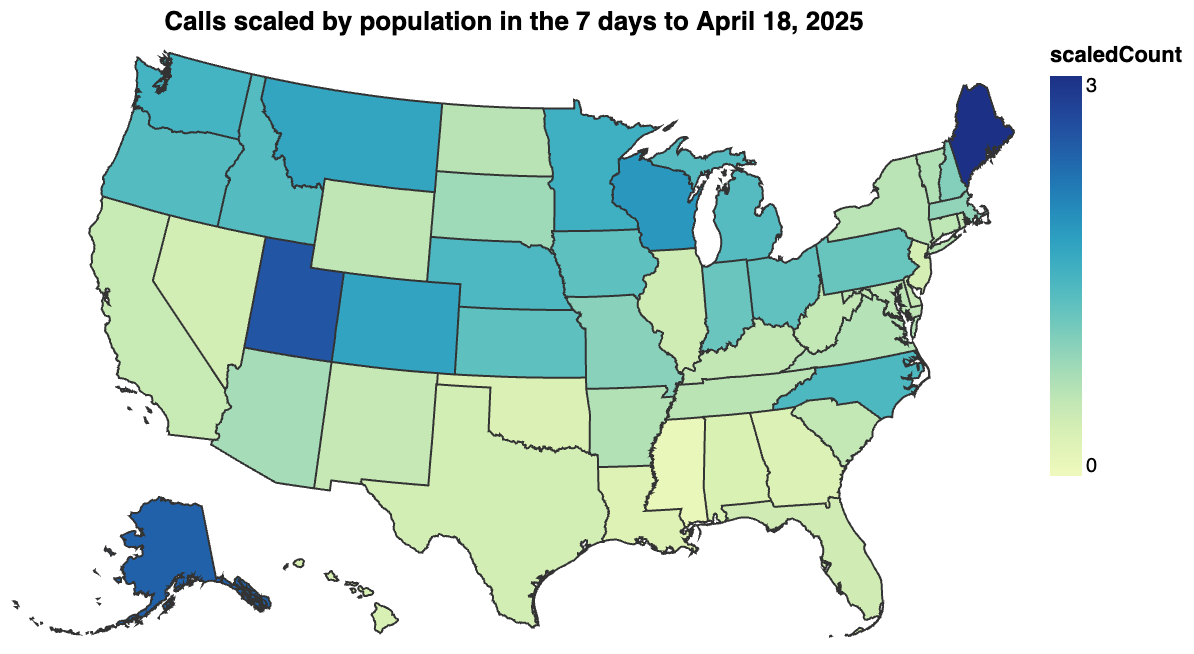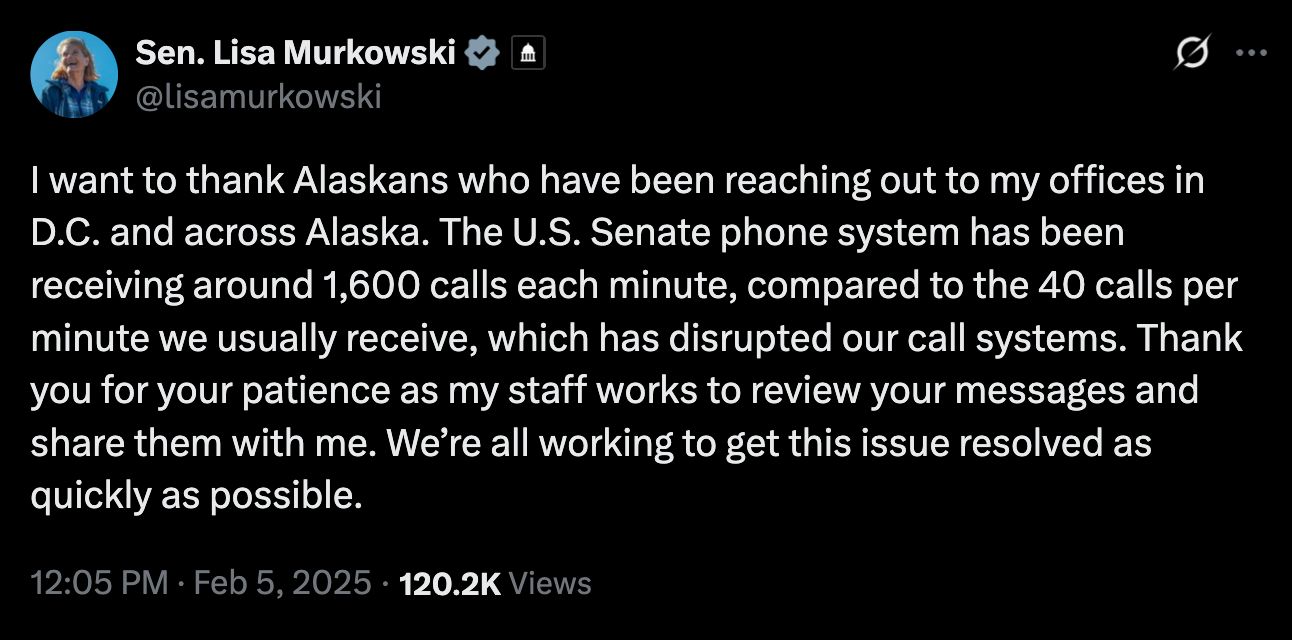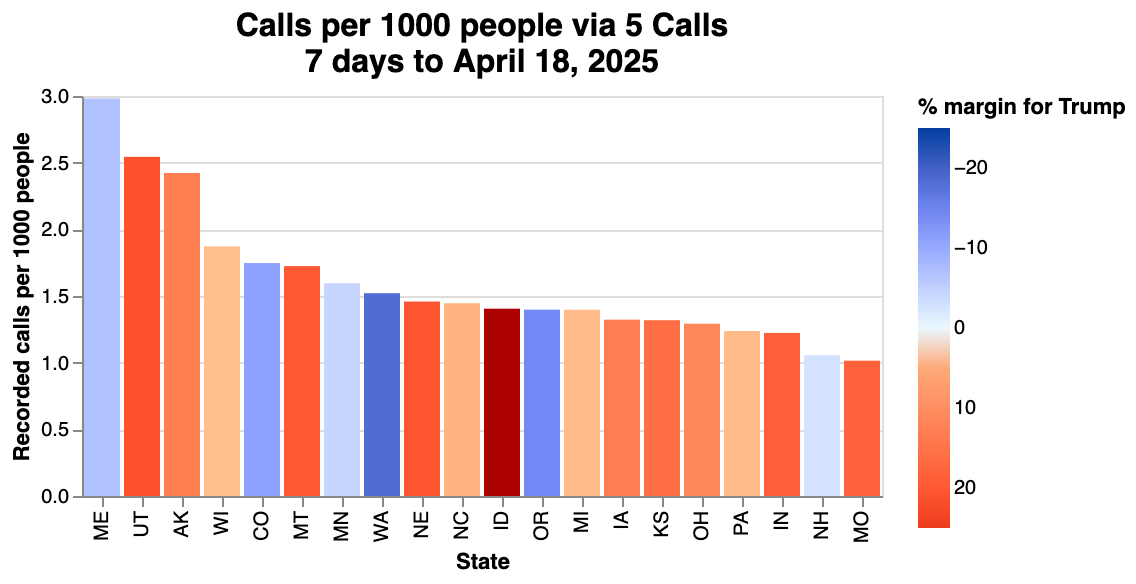El Salvador prison fiasco drives huge call volume to Congress
EXCLUSIVE: The civic engagement app 5 Calls shares data with us showing high call rates in many red states

Last week, people dialed up their lawmakers nonstop in support of wrongly expelled Maryland man Kilmar Abrego Garcia, according to data shared with us by 5 Calls, the popular civic engagement app.
Those calls went to reps all across the country.
As we first revealed earlier this week, the 5 Calls phone drive “Bring Abrego Garcia Home and Stop Trump’s Plan to Traffic Civilians to a Foreign Gulag” drove 84,340 calls within the four days since it went live last Tuesday, April 15, according to their data.
“People reached 3,500 calls per hour about Garcia on Tuesday just via 5calls.org / our apps,” the San Francisco-based app’s data expert Katie Dektar told us. “That's a LOT of calls.”
What other issues fired up callers?
Other phone drives in the app’s Top 5 topics also concerned issues of due process and rule of law. The fourth most popular, “Protest the Unlawful Deportation of Venezuelan Immigrants to El Salvador (UPDATED 4/14),” counted 18,992 calls.
Just above that in the No. 3 spot, “Fight the Trump Administration's Defiance of the Constitution and Courts” drove 27,273 calls, and that largely relates to due process, too. The script cites the Abrego Garcia case, the targeting of pro-Palestine student activists, and the use of the Alien Enemies Act against Venezuelan immigrants.
Those figures cut against the common wisdom that bread-and-butter issues are what animate constituents.
“I think people understand that if somebody can be thrown in jail in El Salvador with no due process that could be anybody,” 5 Calls co-founder and chief operating officer Rebecca Kaufman said in a phone interview.
The second-most popular topic, “Oppose the SAVE Act (H.R. 22) - A Voter Suppression Bill - Passed House,” drove 49,759 calls, and the fifth most popular, “Oppose Funding Cuts to NPR and PBS,” sparked 11,033 calls.
The scripts reflect the ideals and politics of the volunteer-driven company.
“We research issues, write scripts that clearly articulate a progressive position, figure out the most influential decision-makers, and collect phone numbers for their offices,” their about page says.
How representative is 5 Calls data of the bigger picture?
The 5 Calls data shared with us offers a unique glimpse into a form of political action that’s usually hard to quantify. There’s no central, public repository of U.S. Capitol switchboard information for journalists and researchers to access.
5 Calls co-founder and technical director Nick O’Neill found that Sen. Lisa Murkowski, R-AK (202-224-6665), helped him complete the broader picture of constituent calls outside the app with a social media post this past February.
“The U.S. Senate phone system has been receiving around 1,600 calls each minute, compared to the 40 calls per minute we usually receive, which has disrupted our call systems,” Murkowski posted on Feb. 5, 2025.
Cross-referencing Murkowski’s data point with 5 Calls internal data, O’Neill discovered their wide reach.
“We peaked at 236 call completions per minute on the day before about various topics, primarily DOGE beginning to get access to various government departments,” O’Neill said. “This is just about 15% of Sen. Murkowski’s total number.”
5 Calls believes the actual share of calls their app generates may have been double that percentage.
That’s because people routinely share their phone drive and script information on Instagram, TikTok, and other social media apps, urging their followers to call the Capitol switchboard’s main line. Those calls, though derived from 5 Calls actions, are inaccessible for their data.
“I would love to find other ways to have insight into how many calls offices are getting to better estimate our impact, particularly on more ‘normal’ days,” O’Neill says.
Breaking through the narratives
Within the seven days leading to April 18, the three U.S. senators who received the highest proportion of calls relative to state population were Susan Collins, R-Maine (202-224-2523); Mike Lee, R-Utah (202-224-5444); and Angus King, I-Maine (202-224-5344).
Their counterparts in the House were Reps. Chuck Edwards, R-N.C. (202-225-6401), Pramila Jayapal, D-Wash. (202-225-3106); and Betty McCollum, D-Minn. (202-225-6631).
We reached out to the Top 3 senators and representatives on the lists for comment, and we’ll update the story if they respond.
That Republicans topped the list in both chambers of Congress didn’t surprise the 5 Calls staff, but Jayapal’s appearance in the No. 2 spot of the House of Representatives did.
“Because she is a fairly strong progressive,” COO Kaufman explained.
At that point, O’Neill, her husband, chimed in: “That’s just a common narrative we have to fight back against for callers: ‘Oh, you know, my Democratic reps already support everything I want them to so I don’t have to challenge them.’” Jayapal rising to such a top spot showed a crack in the wall of that assumption.
For senators, 5 Calls always scales the data by state population. Otherwise, deep-blue California would always dominate that data, painting a misleading and incomplete picture of the week’s trends. Information about House representatives, who hold non-statewide offices, is not scaled in the same way on the list.







